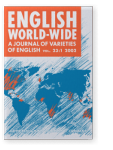Vol. 23:1 (2002) ► pp.93–113
Uses of English in Southern British Cameroons
This study looks into the use of English in Southern British Cameroons, a territory where English was introduced some 500 years ago by British privateers. The data are a collection of answers to a questionnaire devised to check the respondents’ use of English in various domains such as the home, neighbourhood, place of work and others. The findings reveal that English, a co-official language of the country, is gradually entering the home environment, where the indigenous languages are expected to dominate; it is the language of instruction in primary and secondary schools, and of religion and the court as pastors and lawyers consistently use it in their respective trades; in short it is the means of expression of educated people, the elite of the land.
However, English finds itself in a situation of competition with other languages in this territory. At a lower level, it has to compete with Pidgin English, a contact language which dominates the neighbourhood domain. At a higher level, it competes with French, the other official language, which is dominant in tertiary level education, in the media (where most newspapers as well as most foreign radio and cable television programmes are in it), in public places (where respondents report overhearing talks and reading notices in tongues other than English), and in the civil service (where most official correspondences are initiated in it). In short what seems to have been taking place in the country since Reunification with French Cameroon in 1961 is a one-way bilingualism, with speakers of English being made to fully operate in French.
Cited by (10)
Cited by 10 other publications
This list is based on CrossRef data as of 2 july 2024. Please note that it may not be complete. Sources presented here have been supplied by the respective publishers. Any errors therein should be reported to them.
